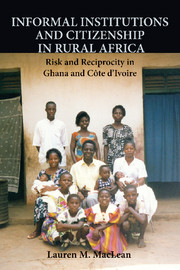 Informal Institutions and Citizenship in Rural Africa
Informal Institutions and Citizenship in Rural Africa Published online by Cambridge University Press: 05 May 2010
Not until the basic challenges of political administration had been undertaken did the British and French colonial rulers consider expanding the state provision of social services in the Gold Coast and Côte d'Ivoire. State social service provision was minimal until the Great Depression, and really only intensified after World War II. The different histories of political administration established in the earlier part of the colonial era resulted in the subsequent development of contrasting social policies in the Gold Coast and Côte d'Ivoire that continue today. Since divergent political administrative configurations produced different sets of experiences among state and societal actors, state actors had differing views of local social welfare needs, as well as contrasting perspectives on the existing local capacity to fulfill those needs. These different assessments of need and capacity framed the development of divergent colonial and postcolonial social policy in each of the cases.
During the colonial era, social policy in the Gold Coast was seen as supplementing the “traditional” systems of social welfare in the community while, in Côte d'Ivoire, administrators aimed to supplant these “inadequate” systems with more activist policies for individuals. Ironically, despite pressures from the World Bank and International Monetary Fund to adopt similar types of social service reforms during structural adjustment programs (SAPs), the formulation of policy and the local experience of state social service provision continued to differ in these two regions in the 1990s.
To save this book to your Kindle, first ensure [email protected] is added to your Approved Personal Document E-mail List under your Personal Document Settings on the Manage Your Content and Devices page of your Amazon account. Then enter the ‘name’ part of your Kindle email address below. Find out more about saving to your Kindle.
Note you can select to save to either the @free.kindle.com or @kindle.com variations. ‘@free.kindle.com’ emails are free but can only be saved to your device when it is connected to wi-fi. ‘@kindle.com’ emails can be delivered even when you are not connected to wi-fi, but note that service fees apply.
Find out more about the Kindle Personal Document Service.
To save content items to your account, please confirm that you agree to abide by our usage policies. If this is the first time you use this feature, you will be asked to authorise Cambridge Core to connect with your account. Find out more about saving content to Dropbox.
To save content items to your account, please confirm that you agree to abide by our usage policies. If this is the first time you use this feature, you will be asked to authorise Cambridge Core to connect with your account. Find out more about saving content to Google Drive.